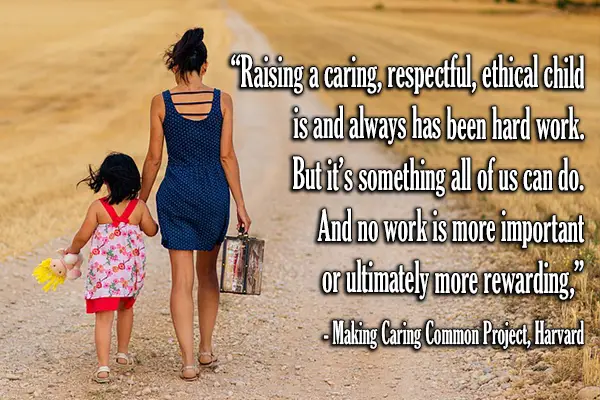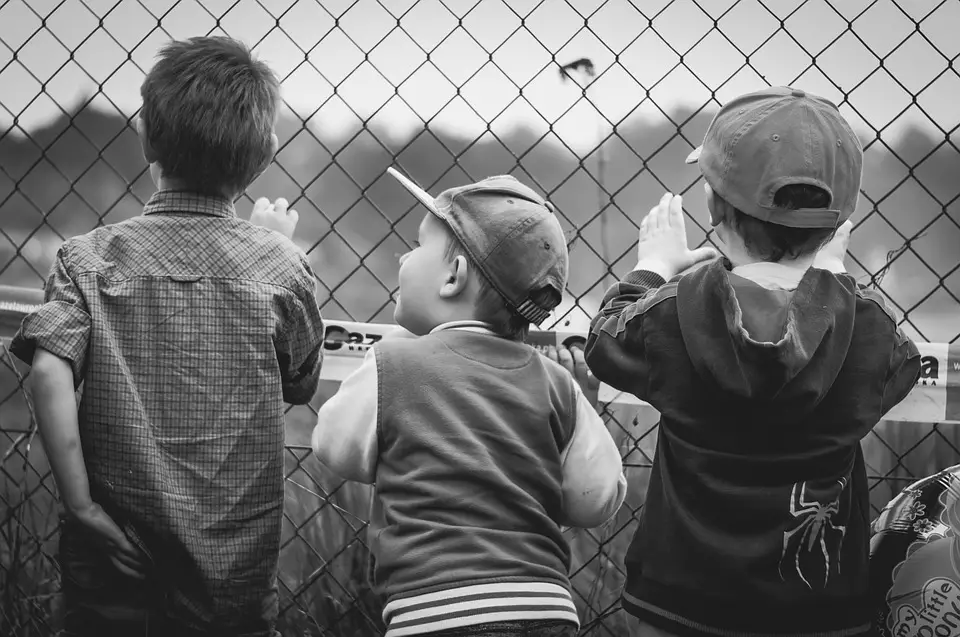Many of us were hoping that our high-tech lives would make parenting easier – apps for tablets and smart phones are able to give children knowledge on any subject, entertain them with a movie or a game, and keep them occupied while we go through our hectic days.
But the downfalls of this technology are huge; there is a bigger disconnect than ever between children and parents. The parents of the Information Age are having a harder time building loving relationships with their children, which in turn leaves some kids unable to create healthy friendships, to understand how to be caring and helpful to others, to feel and express gratitude, to think for themselves, and to understand and control feelings and emotions in a healthy way.
As a part of the making Caring Common Project, Harvard University compiled the following seven main tips from their most recent research about raising kids that are kind, caring, respectful, helpful, grateful, and ethical. [The main funding sources are summarized from the study along with the writer’s own interpretations and thoughts on the subject].
- Build loving relationships with your kids with intention – Children learn by example and will treat others the way they have been treated. They need to feel like they are in a safe, loving and stable space. To show that the parents can do the following:
- Spend planned time with your children, so the child does not have to wonder when is the next time they can see or play with their parent will be. For example, you can have a tradition of going to the movies every Sunday morning, or going to the park every Saturday.
- Ask the child questions that let them share what really matters. The question “how was your day?” is limiting and does not open up the conversation. Instead ask: “What was the best part of your day”? or “What did you do today that you feel good about?”
- Be a model and a mentor for your child – Pay close attention to the small things that you do because your child will repeat them. Telling white lies or getting angry over little things means your child will probably end up doing the same thing. At the same time, we’re not perfect, so if you are overwhelmed or are feeling negatives emotions, it’s up to you as the parent be self-aware of what is going on and repair the relationship. To do so try the following:
- Honesty: whenever you make a mistake that affects the child, talk to your child about what happened, apologize, and explain to them how you plan to not repeat the mistake in the future. By doing this you are allowing the child to live by your example and fix their mistakes. Everyone makes mistakes!
- Community: volunteer or take parts in the events in the community and bring your child along. Show them how important and fulfilling it is to give selflessly.
- Ask others for advice: parenting is hard, and you will not have all the answers at all times. When things get difficult, ask others who you trust. (Ex. Am I being fair to my child when I do this? Is this the best decision?)
- Take care of you: you can only give to others when you’re personally healthy and happy. Do not forget to take care of your physical and mental states: go for a walk, take a yoga class, or treat yourself to a spa day.
- Make sure your children understand what truly caring for others means – Though most parents and caretakers tell their children that they care about them, and how important it is to care for others – getting the child to truly hear and understand the message requires the following:
- Set high expectations – when you say you are going to do something (ex. being present at their school play), be sure to have the integrity to follow up on that promise.
- Teach the children to treat others with respect, regardless of how the other person is acting. Even if the other person is yelling, screaming, and being a bully, the child needs to understand that reflecting the same behavior is not the answer.
- Encourage the child to try to show perseverance and to not give up when things get difficult, whether they’re in a friendship or part of a team of some kind
- Create opportunity for the child to practice being grateful and caring – It is very important for the child to truly grasp how many people positively contribute to their life and how to be grateful for that.
- Responsibilities: make helping out around the house an expected daily routine and only praise “uncommon acts of kindness.”
- Talk to the children about caring acts when they see it in their own lives or on television and in books.
- Gratefulness: make it a daily routine to express gratitude to the people in the child’s life, parents or caretakers, teachers, relatives, friends, and strangers.
- “Expand your child’s circle of concern” – It is easy for most children to be compassionate about the people who are constantly in their lives: family and friends. But they also need to learn to be empathetic towards people they do not know as well, people they have never met, and people who are different from them.
- Encourage the child to help out other kids in school who are faced with some kind of challenge: the kid who acts shy and does not have friends yet, the kid who just moved from another country and does not speak much English, or the kid who is being teased by others.
- Talk to the child about events in the community and the world. What challenges are the other people facing with and how they are dealing with these obstacles? Teach the child to put themselves in the other person’s shoes and understand different perspectives.
- Promote active listening. All of us want to be heard. Encourage the child to listen and understand the person who they have never met or who is harder to understand.
- Teach children to think critically and create positive change in the communities – Children naturally ask “why” questions: Why do I need to do this? They also have interest in leading others when given a chance. To create opportunities for children to take leadership and fight injustice try the following:
- Ask their thoughts about a personal dilemma, such as “Should I invite our new neighbor to the party, even though my best friend dislikes them?”
- Allow children to join causes they feel passionate about: such as saving the environment, protecting animal rights, or providing help for the homeless.
- Encourage children to work together with others on the cause – promote teamwork.
- Talk about an ethical dilemma that you heard about on television or radio.

- Teach children to effectively manage their feelings – Negative emotions such as anger, envy or shame prevents children from caring about others. It is important to help children understand that it is perfectly normal to have feelings, but these feelings should not get in the way of treating others with respect and doing what is right.
- Help children to correctly identify what they are feeling, and encourage them to express it and talk about it.
- Teach them a 3-step self-control technique. 1. Stop. 2. Take a deep breath through the nose and exhale through the mouth. 3. Count to five. Teach them the technique and let them practice when they are calm. Then ask them to do the technique when they are upset, angry or frustrated.
- Teach the child to resolve conflicts by example. When observing someone in real life or television having an argument that did not end with a resolution, role play with the child to find an alternative way of communicating that would leave all people involved feeling heard, and find a solution that everyone is happy with.
“Raising a caring, respectful, ethical child is and always has been hard work. But it’s something all of us can do. And no work is more important or ultimately more rewarding,” the study states.
Thanks for installing the Bottom of every post plugin by Corey Salzano. Contact me if you need custom WordPress plugins or website design.





